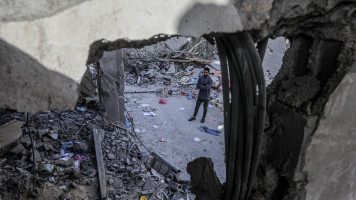Russia warns against 'recklessness' after US threats of Syria retaliation if chemical weapons are used
National Security Adviser John Bolton told his Russian counterpart on Thursday, in the most pointed words yet, that the US would retailiate if there was a repeat of previous chemical attacks on civilian areas.
A senior Russian official, in response, warned the US on Saturday against making any "reckless" moves in Syria, the RIA news agency reported.
"We warn the Americans and their allies against taking new reckless steps in Syria," said Deputy Foreign Minister Sergei Ryabkov.
"We are hearing ultimatums from Washington... and it does not affect our determination to continue our policy for the total elimination of terrorist epicentres in Syria and the return of this country to a normal life," he added.
Earlier this week, on the fifth anniversary of a deplorable chemical weapons attack in Syria which left hundreds of civilians dead, the US, UK and France vowed to take action - as they have in the past against - if any further attacks by President Bashar Assad’s brutal regime are launched.
"As we have demonstrated, we will respond appropriately to any further use of chemical weapons by the Syrian regime, which has had such devastating humanitarian consequences for the Syrian population," the joint statement said.
A Syrian activist group documenting war crimes in April released a list of suspected chemical attacks since 2012, saying it had verified 861 videos from 193 sources covering some 212 attacks in Syria. Most of the material was collected from social media.
Earlier in the year, a report linked Syria's largest sarin nerve agent attack in August 2013 - which left hundreds dead - to the Syrian regime chemical stockpile.
A suspicious chemical attack on Douma in April this year left more than 49 dead, according to medical groups and rescuers. Other estimates have put the death toll at over 100, with punitive strikes launched on selected Syrian regime targets by the US, UK and France.
Graphic images and videos emerged on social media following Douma's gas attack, showing children struggling to breathe and entire families who had succumbed to the attack on the floors of underground shelters.
Russia said it dispatched experts to Douma who had not found any evidence of chemical weapons use. Later, the Russian Foreign Minister Sergei Lavrov claimed that Moscow had "irrefutable" evidence the attack was staged with the help of a foreign secret service.
For its part, France has cited "overwhelming testimony" and extensive analysis by French intelligence services and laboratories that pointed to the Assad regime's involvement.
Both Syria and Russia have made repeated, often contradicatory, denials against using chemical weapons and have blamed the rebels on using it on themselves to whip up international condemnation, or claimed no attack took place at all.
Damascus joined the OPCW in 2014 and agreed to destroy its 1,300-tonne stockpile of industrial munition, under Russia's supervision, following a US-Russian deal.
Despite agreeing to the deal, inspectors have found evidence of an ongoing chemical weapons programme in the country, including systematic use of chlorine barrel bombs and sarin.
Around 500,000 people have died and millions made homeless in seven years of fighting in Syria, which was sparked when regime forces brutally put down peaceful protests in 2011.
![syria destruction [getty] syria destruction [getty]](/sites/default/files/styles/large_16_9/public/media/images/21BAB940-6862-4B01-9F79-13F362F9D0E2.jpg?h=d1cb525d&itok=x4x0voZJ)


